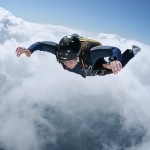Congrats, you’re a Dad. Time to dial back the risk-taking?
From THE RESPONSIBILITY PROJECT by LIBERTY MUTUAL, June 29, 2011
Not long ago, a French-Canadian skydiver named Pascal Coudé, who hopes to break a world record by freefalling for 6 to 7 minutes from an altitude of 30,000 feet, was telling me about his preparation. He plans to make the jump in a baggy costume known as a “wingsuit” – a specially designed jumpsuit with webbing that catches wind and creates massive air resistance. Sounds fun, but in fact it’s incredibly dangerous. If you tire and lose your stable position, you can start tumbling uncontrollably.
When the time seemed right I asked Coudé: “Do you have kids?” He replied that he does – a 19-year-old son.
“Do you think about him as the plane nears the drop zone?”
No, Coudé said. “I’m thinking only of the jump: nothing else.” There could be no distractions up there, in the brief prelude to glory.
Everything about “adventurers” tends to be writ large – which is what makes them such appealing profile subjects. Over the years I’ve covered a guy trying to skydive from the troposphere; a woman diving unprecedentedly deep in the ocean on a single breath; a Norwegian explorer walking across remote northern Canada, without support or even a phone. These are seriously brave people, and very often there’s poignancy to their motivations.
For years I never thought to ask such people, the takers of ungodly risk, if they have children. But now I always ask. It strikes me as an essential question. Seven years ago, when my wife called her dad to tell him his first grandchild – our daughter – had just been born, his first word was: “Congratulations!” He left a beat, and then said: “Your life is no longer your own.” Welcome, in other words, to the world of real, adult responsibility. His statement raised questions about the costs of adventuring. Did morally defensible risk now begin and end with serving past-the-date spaghetti sauce once in a while?
British mountaineering writer Robert Macfarlane makes the distinction between “acceptable risk” and “gratuitous risk.” The moment you become a parent the dividing line shifts, he suggests, and those life-threatening ascents that once earned you praise for courage now fall into the zone of indefensible. On this subject utilitarian philosophers are likewise pretty clear on the rules. To put it in Spock-ish terms: the needs of the many trump the needs of the one.
And so when my daughter Madeline was born I decided, with some encouragement from my wife, that my own Darwin-baiting escapades were over. No more aimless multi-day rambles in the British Columbia wilderness; no more solo kayaking across the Strait of Georgia or scrambles across snow bridges on Rainier. It was an easy choice for someone like me, who really was just goofing around under the flag of extended adolescence. Risk was a hobby, not a calling, and I happily let it go.
But what about professional adventurers like Coudé? For them it’s not about growing up: they’re grown. It isn’t really even about choice. Risk is so much part of what they do, and what they do is so much part of who they are, and who they are is so closely linked to a script that they feel was written for them, that thinking about stopping doesn’t compute. Force them to change and they would simply … cease to be.
“How could I have stopped her?” responded James Ballard when reporters asked what business his wife, Alison Hargreaves, had in summiting K2 – a far more treacherous peak than Everest – when she had young children waiting patiently for her to return. Hargreaves, considered by many the world’s best woman climber, was blown off the mountain in a violent storm in 1995. Hers became a morality tale for the issue of acceptable risk. Harsh judgment tarnished her legacy – harsher, arguably, than it would have been for a man. (Putting a mountain ahead of one’s kids struck many as antithetical to the natural mothering instinct.)
But Hargreaves had her defenders. After the climb that left him a widower, Ballard received letters from women who praised her for not capitulating to domestic life and setting down her ambitions. Her life, even shortened, was a victory for women, they said; becoming a parent doesn’t foreclose on our questing human nature, or at least it shouldn’t. We’re here to see what we can do. Hargreaves had inspired them to follow their own trajectories, these mothers said, no matter what anybody else thought or said.
Of course, Hargreaves’s children never got a vote in the matter. Their mom went to work and one day she didn’t return, plain as that. But her daughter, Kate, and son, Tom, 20 and 22 respectively, are now in a position to weigh in. Both say they are proud of their mother. Tom in particular has become a seriously skilled mountaineer. He’s currently in training to summit the peak that killed his mom, and he may become the first to scale it in winter. He understands her compulsion to push the limits of the sport because, he says, it’s in him too.
Maybe the Spock doctrine about “the needs of the many” and the “needs of the one” is insufficient. It gives equal weight to every life without measure of the quality of that life – how enhanced or impoverished it becomes when you add or subtract risk. The question What do we owe to others? is incomplete without its corollary: What do we owe to ourselves?
Sometime this summer, probably over Arizona, Pascal Coudé will leap from a plane in his wingsuit. And I’m positive that, as he falls — a flying squirrel fighting to hold position in the sky —he won’t be thinking about moral calculus, or utilitarian philosophy. Neither will his son.
